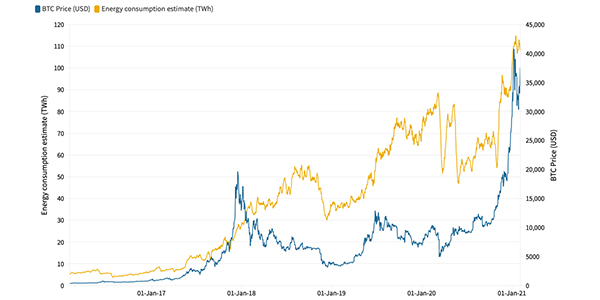
Of course we’re talking about Elon Musk, who also fancies himself a great environmentalist.
What to make of Elon directing Tesla’s purchase of $1.5 billion of Bitcoin and decreeing it currency for the purchase of Teslas?
Hypocrisy. Bitcoin consumes a staggering amount of electricity. Its current annual consumption is estimated at 132 TWh.[1] The world’s banking system electric consumption is estimated at a similar amount of electricity, 140 TWh.[2]
Here’s the deal. Bitcoin’s aggregate value is about $1 trillion,[3] while the world’s banking system represents at least $96 trillion of global money supply.[4] In other words, Bitcoin consumes roughly 100 times as much electricity for an equivalent store of value. Bad news for the planet.
If we do a little more math, it’s estimated that Bitcoin currently represents 0.6% of global electricity consumption.[5] Using Bitcoin’s aggregate value of about $1 trillion, and assuming it were to replace global money supply of $96 trillion, then global electricity consumption due to Bitcoin alone would be about 60% of all current global electricity consumption.[6]
Bitcoin Defenders
Let me touch on two claims made by Bitcoin defenders. First, Bitcoin defenders cite the relatively small percentage of Bitcoin electricity consumption relative to current global electricity consumption. That is a fallacious comparison because Bitcoin at present is a relatively small store of value compared to total global money supply. It’s like the shipping industry saying that bunker fuel (a.k.a. heavy fuel oil) is a small contributor to global carbon emissions (3%) so the industry should get a pass on its enormous carbon emissions per unit of energy. And Bitcoin electricity consumption is exploding as its value increases.[7]
A second claim is that most Bitcoin electricity consumption is served with renewable generation. This claim doesn’t appear to be true, either now or for the future.[8] And even if it were true that would just mean Bitcoin is siphoning off renewable generation that would otherwise displace non-renewable generation.[9]
Bottom Line
Bitcoin is a clear and present danger, directly undermining our efforts to fight climate change.
Maybe Musk is hoping that making Earth hotter will make Mars travel attractive.
[1] https://cbeci.org/ (visited March 19, 2021 at 12:15 am EDT); https://www.forbes.com/sites/lawrencewintermeyer/2021/03/10/bitcoins-energy-consumption-is-a-highly-charged-debate–whos-right/?sh=36df78c07e78.
[2] Id.
[3] Assuming current Bitcoin value of about $57,000, and total Bitcoins outstanding of about 18,600,000.
[4] https://www.visualcapitalist.com/all-of-the-worlds-money-and-markets-in-one-visualization-2020/. This $96 trillion does not include longer term monetary assets. It also excludes other stores of global wealth like real estate and company stocks, which are not themselves money/near money.
[5] Forbes article cited in footnote 1.
[6] The math is $96 trillion divided by $1 trillion times 0.6%.
[7] https://www.cnbc.com/2021/02/05/bitcoin-btc-surge-renews-worries-about-its-massive-carbon-footprint.html#:~:text=Bitcoin’s%20energy%20needs%20are%20%22enormously,to%20the%20Cambridge%20researchers’%20estimates.
[8] https://www.jbs.cam.ac.uk/faculty-research/centres/alternative-finance/publications/3rd-global-cryptoasset-benchmarking-study/ (finding that 39% of cryptocurrency consumption is met with renewable sources); https://qz.com/1982209/how-bitcoin-can-become-more-climate-friendly/; https://www.bbc.com/news/technology-56012952.
[9] And a note on one more wrinkle, the mysterious cap on total Bitcoins of 21 million. While this might suggest an ultimate end to Bitcoin mining, the future is clear as mud. For one thing the number of Bitcoins awarded for every “block” of mining is cut in half every 210,000 blocks, so it gets progressively harder to earn Bitcoins. The standard belief is that mining will continue until around 2040 (unless the cap is somehow lifted and mining continues indefinitely) https://www.investopedia.com/tech/what-happens-bitcoin-after-21-million-mined/. And even if no more Bitcoins could be created, and its mining therefore ends, other cryptocurrency mining could continue.




